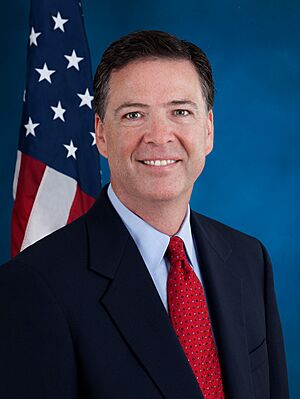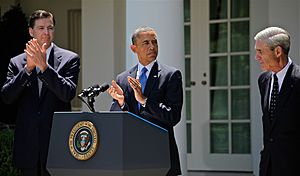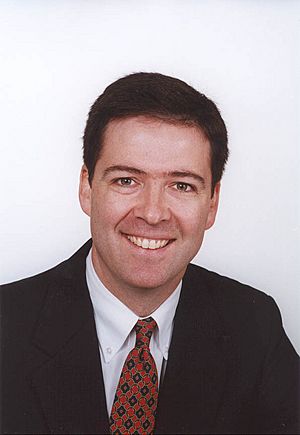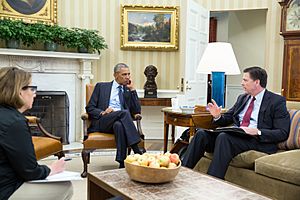James Comey facts for kids
Quick facts for kids
James Comey
|
|
|---|---|

Official portrait, around 2013
|
|
| 7th Director of the Federal Bureau of Investigation | |
| In office September 4, 2013 – May 9, 2017 |
|
| President | |
| Deputy |
|
| Preceded by | Robert Mueller |
| Succeeded by | Christopher A. Wray |
| 31st United States Deputy Attorney General | |
| In office December 9, 2003 – August 15, 2005 |
|
| President | George W. Bush |
| Preceded by | Larry Thompson |
| Succeeded by | Paul McNulty |
| United States Attorney for the Southern District of New York | |
| In office January 7, 2002 – December 15, 2003 |
|
| President | George W. Bush |
| Preceded by | Mary Jo White |
| Succeeded by | David N. Kelley |
| Personal details | |
| Born |
James Brien Comey Jr.
December 14, 1960 Yonkers, New York, U.S. |
| Political party | Independent (2016–present) |
| Other political affiliations |
Republican (before 2016) |
| Spouse |
Patrice Failor
(m. 1987) |
| Children | 6, including Maurene |
| Education | |
| Signature | |
James Brien Comey Jr. (born December 14, 1960) is an American lawyer who was the seventh director of the Federal Bureau of Investigation (FBI). He led the FBI from 2013 until he was dismissed in May 2017.
Comey worked in several important government jobs. Under President George W. Bush, he was the U.S. attorney for the Southern District of New York and later the United States Deputy Attorney General.
In 2013, President Barack Obama appointed Comey as the Director of the FBI. During his time as director, he oversaw major investigations. His actions during the 2016 U.S. presidential election were very controversial.
President Donald Trump fired Comey in 2017. The reasons for his dismissal were widely debated.
Contents
Early Life and Education
James Comey was born in Yonkers, New York, on December 14, 1960. His family later moved to Allendale, New Jersey. His father worked in real estate, and his mother was a computer consultant.
Comey attended Northern Highlands Regional High School. After high school, he went to the College of William and Mary, where he graduated in 1982 with degrees in chemistry and religion. He then earned his law degree from the University of Chicago Law School in 1985.
Early Career as a Lawyer
After finishing law school, Comey started his career as a law clerk for a federal judge in Manhattan. He then joined the U.S. Attorney's Office for the Southern District of New York, where he worked as a prosecutor from 1987 to 1993.
From 1996 to 2001, Comey was a managing assistant U.S. attorney in Richmond, Virginia. He was the lead prosecutor in the case related to the 1996 Khobar Towers bombing in Saudi Arabia. He also taught law at the University of Richmond School of Law.
Working in the Bush Administration
Under President George W. Bush, Comey held two major positions in the U.S. Department of Justice (DOJ).
U.S. Attorney
From 2002 to 2003, Comey was the U.S. Attorney for the Southern District of New York. In this role, he was one of the country's most powerful prosecutors. He led many important cases, including those against major companies and people accused of financial wrongdoing.
Deputy Attorney General
From 2003 to 2005, Comey served as the Deputy Attorney General, the second-highest official in the Department of Justice.
During this time, he was involved in a major disagreement with the White House. The issue was about a secret government surveillance program by the National Security Agency (NSA). Comey and other Justice Department officials, including FBI Director Robert Mueller, felt that parts of the program were not legal. They threatened to resign if the White House did not make changes. President Bush eventually agreed to change the program to address their concerns.
Time in the Private Sector
Comey left the Department of Justice in 2005 to work in the private sector. He became the general counsel for Lockheed Martin, a large defense company. In 2010, he joined Bridgewater Associates, an investment firm.
In 2013, he left Bridgewater to teach at Columbia Law School. He also served on the board of directors for the bank HSBC Holdings.
Director of the FBI (2013–2017)

In 2013, President Barack Obama nominated Comey to be the Director of the FBI. The Senate confirmed him, and he began his 10-year term on September 4, 2013. One of the most significant events during Comey's time as director was the investigation into Hillary Clinton's use of a private email server while she was Secretary of State.
On May 9, 2017, President Trump fired Comey, ending his term as FBI Director less than four years after it began. Comey learned he had been fired from news reports on television while speaking to FBI agents in Los Angeles.
The White House gave changing reasons for the dismissal. At first, it said the firing was based on recommendations from the Department of Justice because of how Comey handled the Clinton email investigation.
Comey's dismissal was very controversial.
Life After the FBI
After leaving the FBI, Comey began teaching at Howard University and his alma mater, the College of William & Mary. He teaches courses on ethical leadership.
He has also written several books. His first book, a memoir called A Higher Loyalty: Truth, Lies and Leadership, was published in 2018. He has also written novels, including the legal thriller Central Park West.
Legal Proceedings in 2025
In September 2025, a federal grand jury in Virginia decided that Comey needed to answer questions in court. The questions were about whether he had made untrue statements to Congress and had tried to block a congressional proceeding. Comey denied the accusations.
Personal Life
Comey met his wife, Patrice Failor, while they were students at the College of William and Mary. They married in 1987 and have five children. Their oldest daughter, Maurene, is also a lawyer. The family lives in McLean, Virginia.
Comey is known for being very tall, standing at 6 feet 8 inches. He was raised Roman Catholic but is now a member of the United Methodist Church. For most of his life, he was a registered Republican, but he now identifies as an independent.
See also
 In Spanish: James Comey para niños
In Spanish: James Comey para niños
 | Calvin Brent |
 | Walter T. Bailey |
 | Martha Cassell Thompson |
 | Alberta Jeannette Cassell |



